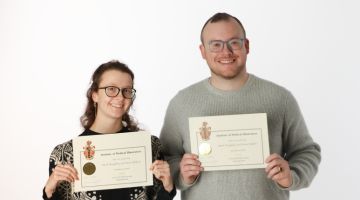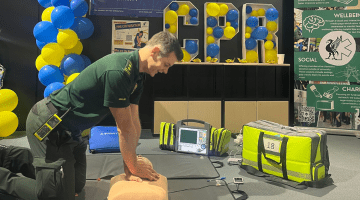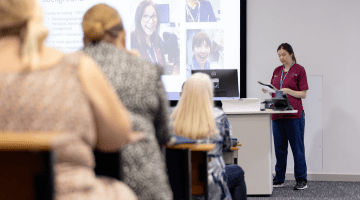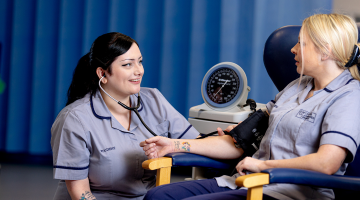Why study this course with LJMU?
Our Postgraduate Certificates (or PgCerts for short), provide the opportunity to study masters-level modules relevant to your clinical specialism or chosen area of development.
Our PgCerts are ideal if you:
- would like to experience level 7 study in a particular area of practice without committing to a full masters degree.
- are looking for specific areas of professional development or training.
- already have a masters degree and are looking to focus on specialist practice.
- want to undertake a masters eventually and accrue credits that can be transferred into it.
PgCert Complexities in Acute Medicine and Surgery is specifically tailored to focus on supporting and developing knowledge and understanding within acute medicine and acute surgical settings, along with recognition and management of the deteriorating patient.
About this course
PgCert Complexities in Acute Medicine and Surgery comprises three 20 credit modules designed to develop your knowledge, skills and understanding within medical and surgical settings.
The course is primarily aimed at practitioners already working within, or who are interested in, the fields of acute medicine, acute surgery and who deal with patients at risk of deterioration. It will equip you with the knowledge and skills to manage the care of these patients.
You will explore a wide range of commonly presenting acute medical and surgical conditions, timely recognition of deterioration, pertinent therapeutic and diagnostic interventions and defensible decision making through case-based problem solving.
The course takes place over a 30 week period (excluding standard university closures) and is structured as follows:
Module 1: Acute Medicine: Presentations and Management (7011NAPPG)
- 15 weeks
- January to April
Module 2: Managing the Deteriorating Patient (7014NAPPG) and Module 3: Acute Surgery: Presentations and Post-Operative Management (7010NAPPG):
- 15 weeks
- April to July
Course modules
Discover the building blocks of your programme
The programme will be facilitated through a combination of face to face delivery and online learning. Each module within the programme has learning designed to reflect the requirements of the module.
7011NAPPG - Acute Medicine: Presentations and Management
This module is designed to support the student who may wish to work within acute medicine. This module will run for 15 weeks and will be facilitated through keynote lectures and problem-based workshops on a range acute medical case histories. Students will work collaboratively with their peers to develop their knowledge of acute medical presentations and the pertinent diagnostic investigations associated with each case. Students will develop their decision making skills to safely manage patients with acute medical conditions.
7014NAPPG - Managing the Deteriorating Patient
Managing the deteriorating patient allows the learner to explore the complexity associated with recognising and responding to early signs of deterioration in patients across a range of settings. Based on national patient safety guidance it entails in-depth exploration of the factors that influence incidents relating to deterioration and the underlying causes for these. It also enables the student to develop knowledge in the early recognition of signs and symptoms that present during early deterioration across a range of systems including the deteriorating neurological, respiratory, renal and septic patients, and compensatory mechanisms, and considers patient examples and how to escalate and manage care within different settings. This module runs over 15 weeks including the assessment point and each session is 3 hours in length.
7010NAPPG - Acute Surgery: Presentation and Post-Operative Management
This module is designed to support students who may wish to work within a surgical environment. This module will run over 15 weeks and will be facilitated through keynote lectures and problem-based workshops on a range acute surgical case histories. Students will work collaboratively with their peers to develop their knowledge of a range of acute surgical presentations and the pertinent diagnostic investigations associated with each case. Students will develop their decision making skills to safely manage and refer patients, and consider the post-operative management and management of associated complications.
Further guidance on modules
Modules are designated core or optional in accordance with professional body requirements, as applicable, and LJMU’s Academic Framework Regulations. Whilst you are required to study core modules, optional modules provide you with an element of choice. Their availability may vary and will be subject to meeting minimum student numbers.
Where changes to modules are necessary these will be communicated as appropriate.
Core modules
Your Learning Experience
An insight into teaching on your course
Your programme offer a variety of teaching and learning approaches that are designed to engage and inspire you. These may include lectures, seminars, group work activities, simulation and tutorials, and may involve both on-campus and online learning.
As you progress through the programme, you will develop and utilise progressively higher-order and mastery-level skills, as well as further developing subject specific knowledge. This will support you to become an inquiring and confident learner, fostering independence in the acquisition, and application of, theoretical knowledge.
You will be:
- Empowered to acquire knowledge through supported, independent learning. This will include being directed to scholarly activities that will prepare you for scheduled teaching activity.
- Supported in engaging in online asynchronous activity. Examples include tutorial discussions, tutor-facilitated discussion boards and collaborative or individual projects, such as wikis, padlets, blogs and e-portfolios. Dedicated and experienced academic staff will actively, iteratively and directly engage with you to facilitate and guide your learning.
RPEL opportunities within this programme may be available in part (up to 20 credits) for the MSc Advanced Clinical Practice programme within LJMU.
For advice and guidance about RPEL or credit transfer at LJMU please visit the academic framework pages for more information and guidance.
How learning is monitored on your programme
To cater for the wide-ranging content of our courses and the varied learning preferences of our students, we offer a range of assessment methods on each programme.
The assessment requirements of the programme and each module are designed to reflect assessments that are authentic and relevant to todays health professional. Assessment throughout this programme is predominantly case presentation based.
7011NAPPG - Acute Medicine: Presentations and Management
The assessment for this module is a professional conversation 20 minutes total in length. Students will participate in a professional conversation with the examiner and will be asked a series of questions related to a clinical case.
7014NAPPG - Managing the Deteriorating Patient
The assessment for this module is the submission of a written essay detailing the management of a deteriorating patient case study. The word count for this assessment is 3000 words.
7010NAPPG - Acute Surgery: Presentation and Post-Operative Management
The assessment for this module is a professional conversation 20 minutes total in length. Students will participate in a professional conversation with the examiner and will be asked a series of questions related to a clinical case.
Where you will study
The School of Nursing and Advanced Practice is based within Tithebarn Building in the heart of Liverpool and close to rail and bus public transport connections. It adjoins the Avril Robarts Library, which offers a wealth of learning and study support resources.
Course tutors

Jeny Sweeney
Senior Lecturer
Jeny is a Senior Lecturer in postgraduate education within the School of Nursing and Advanced practice. Jeny is an active contributor to the MSc Advanced Clinical Practice programme and also within a number continued professional development programmes including specialist practice areas such as critical care and clinical assessment.
Career paths
Further your career prospects
LJMU has an excellent employability record with 96% (HESA 2018) of our postgraduates in work or further study six months after graduation. Our applied learning techniques and strong industry connections ensure our students are fully prepared for the workplace on graduation and understand how to apply their knowledge in a real world context.
The knowledge, skills and clinical understanding provided within this course will support development of both nursing and Allied health professionals who may already work within or are interested in working within medicine or surgical clinical environments. This continued professional development programme is designed to support further development of health professionals who may wish to specialise in these areas of practice.
Tuition fees and funding
- Part-time per credit:
- £50
The University reserves the right to increase tuition fees in accordance with any changes to the maximum allowable fees set by the UK Parliament. In the event of such a change, any fee increase will be subject to a maximum cap of 10% of the total course cost as originally stated at the time of your offer.
Fees
The fees quoted at the top of this page cover registration, tuition, supervision, assessment and examinations as well as:
- library membership with access to printed, multimedia and digital resources
- access to programme-appropriate software
- library and student IT support
- free on-campus wifi via eduroam
Additional costs
Although not all of the following are compulsory/relevant, you should keep in mind the costs of:
- accommodation and living expenditure
- books (should you wish to have your own copies)
- printing, photocopying and stationery
- PC/laptop (should you prefer to purchase your own for independent study and online learning activities)
- mobile phone/tablet (to access online services)
- field trips (travel and activity costs)
- placements (travel expenses and living costs)
- student visas (international students only)
- study abroad opportunities (travel costs, accommodation, visas and immunisations)
- academic conferences (travel costs)
- professional-body membership
- graduation (gown hire etc)
Funding
There are many ways to fund postgraduate study for home and international students. From loans to International Scholarships and subject-specific funding, you’ll find all of the information you need on our specialist postgraduate funding pages.
Please be aware that the UK’s departure from the EU may affect your tuition fees. Learn more about your fee status and which tuition fees are relevant to you.
Opportunities for funding may be available through your workplace employer or alternatively through the Postgraduate Masters Loan scheme. More information can be found https://www.gov.uk/masters-loan
Entry requirements
You will need:
Qualification requirements
How to apply
Securing your place at LJMU
To apply for this programme, you are required to complete an LJMU online application form. You will need to provide details of previous qualifications and a personal statement outlining why you wish to study this programme.
Your university life
From accommodation and academic support to clubs and societies. Find out what LJMU has to offer.
Related Links
Talk to our students
Connect with a current LJMU student for advice and guidance on university life, courses and more.
See what our students are saying
At LJMU we want you to know you’re making the right choice by studying with us. You can see what our students are saying about their experience with us through their reviews on the following websites:
Related Links
News and views
Browse through the latest news and stories from the university
The University reserves the right to withdraw or make alterations to a course and facilities if necessary; this may be because such changes are deemed to be beneficial to students, are minor in nature and unlikely to impact negatively upon students or become necessary due to circumstances beyond the control of the University. Where this does happen, the University operates a policy of consultation, advice and support to all enrolled students affected by the proposed change to their course or module.


















.png)







